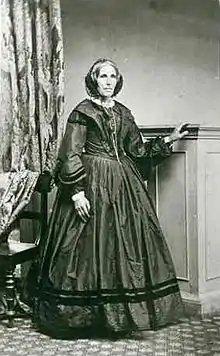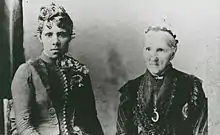Christina Smith (missionary)
Christina Smith (1809–1893), generally referred to as Mrs James Smith, was a teacher and Christian missionary who documented the lives, customs, legends, and language of the Buandig Indigenous Australians (historically spelled Booandik) who live in south-eastern South Australia and western Victoria.

Born in Glenyon, Perthshire, Scotland around 25 July 1809, she was raised a devout Presbyterian. She emigrated to Australia with her son Duncan Stewart (1833–1913) and two brothers after the death of her first husband, reaching Melbourne on 27 October 1839. Her second marriage was to James Smith, a Presbyterian teacher at the Collins Street Congregational Church. Christina had eight children in this marriage. The Smiths moved to Rivoli Bay south (Greytown) in 1845 where Christina acted with Christian compassion for the Buandig people concerned at their treatment by other European settlers and engaged in education and Christian missionary work with the aborigines.[1] For several years she was the only white woman in the southern end of the district.[2]
Christina and her son Duncan Stewart learnt the Bungandidj language with Duncan being appointed an interpreter for this language in 1853. The family moved to a small farm near Mount Gambier in 1854 where Christina opened a night school teaching aboriginal orphans and adults until James Smith's death in 1860. A day school was opened in 1864 in Mount Gambier teaching scripture and the rudiments of a basic education to aboriginal children. After an epidemic and loss of support for her school and with student numbers reduced to 4, the school closed in 1868, although it continued as a home for Buandig orphan children.

Her book on the Buandig people - The Booandik Tribe of South Australian Aborigines: A Sketch of Their Habits, Customs, Legends, and Language- was published in 1880 containing ethnographic observations, personal anecdotes, brief biographies of local natives who converted to Christianity, and a comprehensive vocabulary of the Bungandidj language and grammatical construction. She also contributed material in 1881 to the work of anthropologist Alfred William Howitt.[1][3]
Smith died on 28 April 1893 at Mount Gambier and is buried in Lake Terrace cemetery.[1][2]
The school in Mount Gambier where Christina Smith taught was added to the South Australian Heritage list in 1994.[1]
The Lady Nelson Discovery Centre in Mount Gambier uses a hologram image of Christina Smith to explain the story of the region's early contact between settlers and Aboriginal people.[4]
See also
References
- MacGillivray, Leith G., Smith, Christina (1809–1893), Australian Dictionary of Biography, National Centre of Biography, Australian National University, http://adb.anu.edu.au/biography/smith-christina-13198/text23895, accessed 14 September 2011.
- Obituary, Mrs Christina Smith Dead, The Advertiser (Adelaide), 29 April 1893. Accessed 14 September 2011.
- Christina Smith, The Booandik Tribe of South Australian Aborigines: A Sketch of Their Habits, Customs, Legends, and Language, Spiller, 1880
- Amanda Nettelbeck , The Australian frontier in the museum, Journal of Social History / Summer, 2011. Accessed 14 September 2011
External links
- Leith G. MacGillivray, Smith, Christina (1809–1893), Australian Dictionary of Biography.